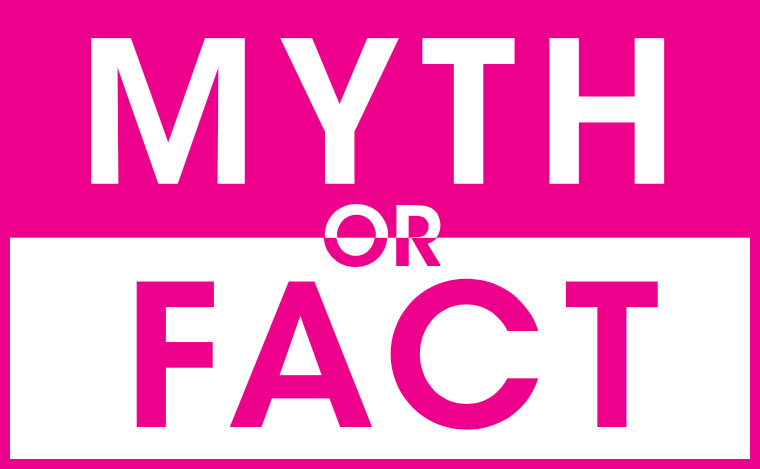Home » Decoding Acne
Decoding Acne
When it comes to acne, there is an overwhelming amount of information – everyone seems to have an opinion! Just because you’ve had acne doesn’t make you an expert.
Whether it’s what causes acne, who’s more likely to have acne or the best way to get rid of pimples, we’ve tackled some of the most common acne myths to give you the facts and a quick tip or two!

Junk food is a major cause of acne
Chips, chocolates and other treats may not be great options for your health but unhealthy food choices alone can’t be blamed for your acne. One study (in 2020) found sugary beverages, fatty and sugary products, and milk may be associated with adult acne but we need more high-quality evidence before making any definite recommendations.
TIP: A low GI diet may help with acne. That means choosing grainy breads instead of white breads, sweet potato over regular potatoes and load up on the legumes.
Pimples are just a teen issue
Saying goodbye to your teens doesn’t necessarily mean saying goodbye to pimples! Very few people escape acne as teenagers but now, adult acne appears to be a global trend and it’s affecting more women than men. Hormones, family history, stress and having children later in life are all possible causes of adult acne.
TIP: Don’t wait to ‘grow out of acne’. It’s a medical condition that can leave permanent physical reminders (scars) and cause psychological issues such as depression whether you’re 14 or 40 so make time to see a doctor for individual treatment advice.
Acne is caused by poor hygiene
Acne happens when the oil glands (pores) in the skin become blocked. Hormones make the oil glands produce more oil (sebum) and if the pores are blocked, a build-up occurs and you’ve got acne. It is not caused by poor hygiene, however keeping your skin clean will help acne.
TIP: Choose a gentle, soap-free skin cleanser and cleanse morning and night, followed by a light moisturiser.
Make-up doesn’t affect acne
Choosing the ‘right’ make-up can help or hinder your acne. Wearing make-up can help with your confidence, especially if it’s hiding blemishes or redness, but some ingredients and types of make-up can aggravate acne.
TIP: Oil-based foundation can make acne worse so opt for a silicone-based foundation and don’t forget to give your skin a breather with a make-up free day once a week. Ensuring that your makeup is removed at the end of the day with a gentle oil free make-up remover, such as micellar water, will also help manage acne breakouts.
More is better with topical acne medication
Using too much of these acne treatments can actually worsen acne because it can lead to dryness, irritation and more blemishes. Everything in moderation – treatments are helpful but too much isn’t better!
TIP: Follow the instructions that come with your medication and if you’re unsure of anything, check with your prescribing doctor.
Sunlight, sun-baking or solariums will improve acne
Some people do notice that their acne is better in summer but the benefits of extra sun exposure are at best small, while the risks are large. Sun exposure can cause inflamed spots to turn dark brown. It will also cause premature wrinkles, other signs of aged skin, skin growths and skin cancers.
TIP: Sunscreens are essential for everyone, even if you have darker skin. Some acne medications make your skin extra sensitive to the sun so sunscreen is even more important. Choose a light weight oil free or ‘non comedogenic’ sunscreen.
Stress doesn’t cause acne breakouts
Stress hormones can upset the skin and cause acne breakouts for some people. Research has shown the worse the stress, the worse acne can become. Anxious students had worse acne and dermatologists have noticed that women with adult acne often have stressful jobs.
TIP: It can be really hard to stress less. Try to keep eating well and getting fresh air and exercise. Find a relaxation technique that works for you, chat to a trusted friend or talk to your GP.
Pregnancy acne is a myth
It’s typically a time of great happiness but hormonal changes related to pregnancy can put a downer on things by causing acne or making it worse. If you have hormonal acne, it’s likely to flare during the first trimester of your pregnancy and will probably improve or may even disappear during the last trimester.
TIP: Acne treatments with proven safety in pregnancy include topical treatments such as benzoyl peroxide, erythromycin, clindamycin and azelaic acid. It’s always best to talk to your doctor before starting any medications – pregnant or not!
Acne isn’t hereditary
Some traits do ‘run in the family’ and acne can be one of them. Studies show that the likelihood of acne is greater in people whose parents or siblings have also had acne. This has been seen in studies of twins and in hormonal acne in female family members.
TIP: If you know that acne ‘runs in your family’ it may be helpful to have a good skin care regimen before your teenage years. Early identification and treatment of acne will help minimise any scarring.
